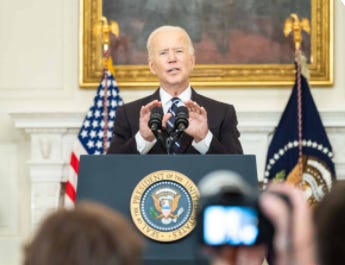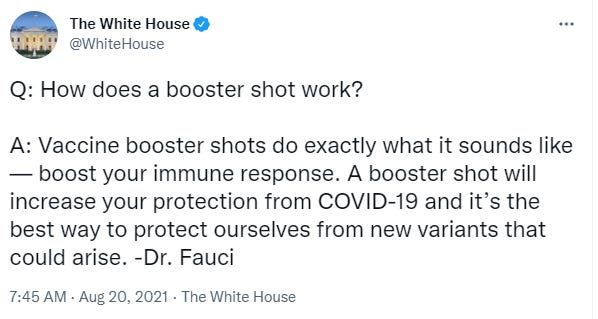The Politicization of Booster Shots
The Biden Administration is pressuring scientific experts to approve a political decision already made -- That's not how it's supposed to work
On August 18. 2021 President Biden announced a plan for free COVID-19 vaccine booster shots for all adult Americans:
Earlier today, our medical experts announced a plan for booster shots to every fully vaccinated American — adult American. You know, this shot will boost your immune response. It will increase your protection from COVID-19. And it’s the best way to protect ourselves from new variants that could arise.
The plan announced by medical experts that President Biden referred to was signed by seven of the Administration’s political appointees, including the director of the Centers for Disease Control (CDC), the Acting Commissioner of the Food and Drug Administration (FDA) and the Director of the National Institutes of Health (NIH).
The agency leaders announced,
Based on our latest assessment, the current protection against severe disease, hospitalization, and death could diminish in the months ahead, especially among those who are at higher risk or were vaccinated during the earlier phases of the vaccination rollout. For that reason, we conclude that a booster shot will be needed to maximize vaccine-induced protection and prolong its durability.
President Biden explained that booster policy planning had been underway for a while, “My administration has been planning for this possibility and this scenario for months.”
Both President Biden and the agency heads explained that implementation of the booster policy, scheduled to begin September 20, 2021, would be contingent on “approval from the Food and Drug Administration and the CDC’s Committee of outside experts.” This disclaimer did not stop administration officials from kicking off a campaign to promote the scientific benefits of booster shots, such as in the Tweet below.
On August 31, the White House COVID-19 czar, Jeff Zients, characterized the booster decision to be based on scientific judgments of agency leaders:
[The booster] decision was made by and announced by the nation’s leading public health officials… and as our medical experts laid out having reviewed all the available data, it is in their clinical judgment that it’s time to prepare Americans for a booster shot.
The timeline is troubling.
The booster policy was announced before evidence was available for its efficacy or that the policy’s benefits outweigh its risks. One result of the policy-first-evidence-later approach has been to place pressure on FDA and CDC to provide evidence that would support a decision already made. As Politico reported on August 31, “FDA officials are scrambling to collect and analyze data that clearly demonstrate the boosters' benefits before the administration’s Sept. 20 deadline for rolling them out to most adults.”
This is the production of policy-based evidence, not evidence-based policy. FDA’s role now is not to approve a policy proposal, but to halt a policy that has already been approved, pending their assent. The head of the FDA is a political appointee by President Biden meaning that FDA non-approval of the boosters is almost inconceivable at this point, regardless what its advisory committee says, as such a decision would place the FDA leader in the position of derailing a policy already announced by the President, due to be implemented starting in two weeks.
Not only do these dynamics look bad, they create incentives for science to be tailored to meet political needs. Indeed, two of the FDA’s top vaccine regulators announced their retirements based on “anger over the agency’s lack of autonomy in the booster planning.” This is no way to sustain trust in federal agencies.
One close observer, Dr. Carlos del Rio, an infectious disease specialist at Emory University, also finds the timeline troubling:
We have very strong science organizations like C.D.C. and F.D.A. They need to make the recommendations. frankly very upset that the administration is bypassing those very important scientific bodies that should be making those recommendations.
So too does another expert, as reported by the New York Times,
“This process has been the reverse of what we would normally expect in vaccine policy,” with the administration announcing plans based on a certain outcome before regulators can complete their review, said Jason L. Schwartz, associate professor of health policy at the Yale School of Public Health.
And Celine Gounder, an infectious disease specialist at Bellevue Hospital in New York, told Bloomberg news: “Because it feels like the scientific process is being short circuited by political concerns... It is almost science by popular demand.”
The issue has become even more complicated with the two FDA officials who announced their retirements in protest co-authoring an article in The Lancet this week strongly opposed to booster shots. That article was harshly criticized by Nobel Prize winning economist Paul Romer as “advocacy that pretends to be science.” We are witnessing an argument over policy differences being played out in the guise of science. It is unseemly all around, and lends itself to delegitimizing the whole process.
The FDA officials who co-authored The Lancet article and whose retirements will become official later this fall are among those within FDA responsible for approving the booster shots. The FDA vaccine advisory committee meets this Friday and will need to consider the new paper in The Lancet – and thus, to provide expert advice on judgments already made by the recipients of that guidance. Awkward and unfortunate.
The World Health Organization is opposed to the general administration of booster shots at this point, recommending that they be limited to vulnerable populations. In many places around the world most people have yet to have a first vaccination shot, which offers far more benefits than a third. As Zeynep Tufekci of the New York Times succinctly put it, “A third dose here is a first dose denied to someone else. Whatever we choose, that is just plain reality.” Any consideration of benefits and risks of rolling out booster shots needs to recognize that we remain in a global pandemic.
Any decision on boosters will thus invariably be political, and ideally informed by scientific judgments. The Biden approach to the decision has resulted in the the scientific judgments being unnecessarily informed by politics. Of course, separating science and politics is impossible and undesirable, but we have choices in how we integrate them, and some choices are better than others.
The Biden Administration has engaged in a similar practice to that which the Trump Administration was criticized for — announcing policy before evidence was available to support or justify the policy, based on decisions made quickly by political appointees. This has the effect of devaluing expertise and damaging the legitimacy of the federal agencies tasked with responding to the pandemic. Public trust may be at risk. Of course, the intense politicization of science at the highest levels of the U.S. government is neither new, nor confined to one political party.
As I have written before, the Biden Administration’s response to the pandemic has been compromised by the complete lack of a high-level science advisory mechanism, independent from political appointees, that could offer guidance on policy issues such as booster shots. Such a committee need not arrive at a consensus policy recommendation, it could also evaluate alternatives, and present evidence for the risks and benefits of different courses of action. Such a body would not guarantee good decisions, but it would help to more clearly differentiate advice provided by independent experts from decisions made by political appointees.
U.S. pandemic policy will continue to experience missteps and encourage unnecessary conflict between agency experts and political appointees so long as the president and his administration fail to have a strategy for “following the science,” as President Biden likes to say. Right now scientists are being asked to fall in line with the politics, and that is never going to work.
Paying subscribers to The Honest Broker receive subscriber-only posts, regular pointers to recommended readings, occasional direct emails with PDFs of my books and paywalled writings and the opportunity to participate in conversations on the site. I am also looking for additional ways to add value to those who see fit to support my work.
There are three subscription models:
1. The annual subscription: $80 annually
2. The standard monthly subscription: $8 monthly - which gives you a bit more flexibility.
3. Founders club: $500 annually, or another amount at your discretion - for those who have the ability or interest to support my work at a higher level.






Really nice round-up and thoughtful commentary.